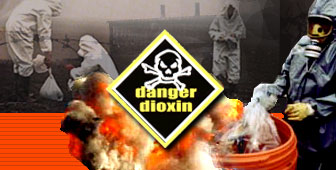Swiss group liable for millions from Italian chemical disaster

Victims of Italy's worst ecological disaster intend to sue a Swiss firm for "moral damages".
The lawyer representing 10,000 residents of Seveso, a town north of Milan, say his clients will seek compensation for emotional trauma caused by a chemical leak at the Icmesa plant in 1976. Damages could run to tens of millions of euros.
He was speaking to swissinfo after the Italian supreme court ruled last week that Seveso’s residents could sue Givaudan, the Swiss firm that owned the factory, for moral damages.
The leak sent a cloud of toxic dioxin into the air above Seveso, resulting in Italy’s worst ecological disaster.
Contamination
There were no fatalities from the accident, but homes had to be demolished as part of the cleanup operation and 750 people were forced to leave the area. Almost 200 cases of chloracne – a skin disorder caused by exposure to dioxin – were confirmed, while hundreds of pets and cattle were destroyed because of contamination.
At the time, the Swiss flavours and fragrance group, Givaudan, paid around SFr300 million in compensation to the residents and in decontamination costs.
But the company now faces up to 10,000 claims from residents to compensate for emotional trauma. Residents complain that they have lived for years with the threat of cancer, and pregnant women have agonised over whether they should abort.
“We are very relieved by the decision,” Francesco Borasi told swissinfo. “After a series of rulings in Givaudan’s favour, there’s finally been a breakthrough.”
Out of court deal?
Borasi, who has been working on the case since 1982, said he did not yet know what the final settlement would be, but he hoped an out of court deal could be reached with Givaudan.
However, Peter Wullschleger, a spokesman for Givaudan, said it was unlikely that an out of court agreement would comply with European legislation.
Wullschleger said the likeliest outcome was that Italian courts would have to assess the validity of each individual claim, while the compensation would be based on previous legal cases of chemical contamination.
“At the moment, there is a lot of speculation about the sum we will have to pay, but the fact is that we haven’t even received a copy of the ruling yet,” Wullschleger told swissinfo. “But we think it unlikely that thousands of residents will able to provide hard evidence of moral trauma.”
He added that Givaudan had made “ample provisions for possible compensation claims”.
Proof of trauma
Borasi said evidence of moral damage was likely to be based on the frequency of medical check-ups after the accident, although he added that the Supreme Court had not yet issued advice about how emotional trauma should be defined.
“Every single claim is individual and will have to be based on previous cases,” Wullschleger told swissinfo. “And providing evidence of trauma is unlikely to be a straightforward procedure.”
Wullschleger added that the Swiss drugs company, Roche, which owned Givaudan at the time of the disaster, was completely freed of liabilities since Givaudan’s spin off in 2000.
by Vanessa Mock

In compliance with the JTI standards
More: SWI swissinfo.ch certified by the Journalism Trust Initiative
You can find an overview of ongoing debates with our journalists here. Please join us!
If you want to start a conversation about a topic raised in this article or want to report factual errors, email us at english@swissinfo.ch.